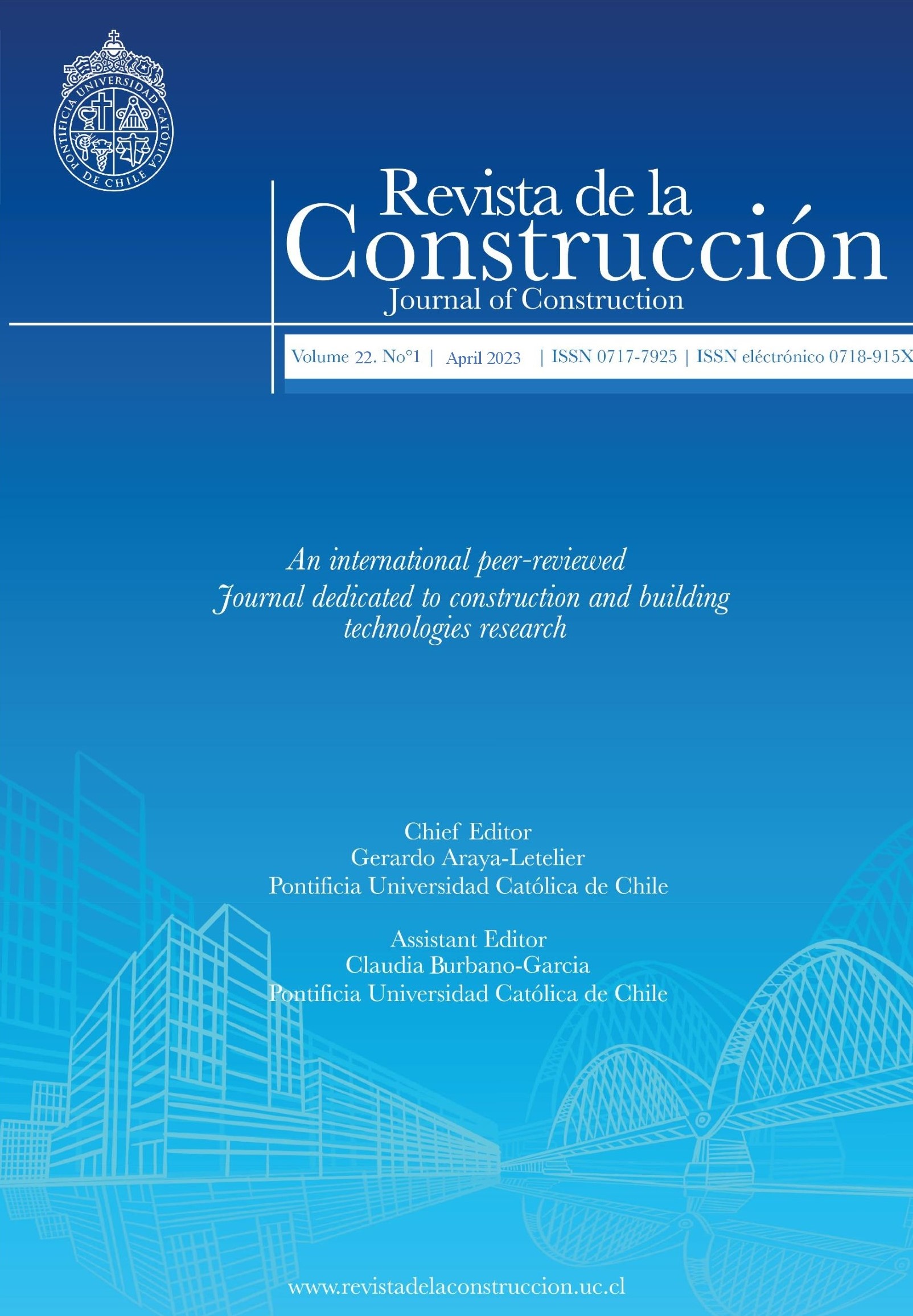Incorporating vegetal fibers for sustainable sandy soil
DOI:
https://doi.org/10.7764/RDLC.22.1.135Keywords:
Fiber reinforcement, optimum, sand, shear strength, vegetal.Abstract
Incorporating fibers into the soil is a reinforcement remediation technique to improve its physical and mechanical properties. Depending on the type of fibers, synthetic fibers, have negative impacts on the environment linked to the waste of their chemical industry. Currently, vegetal fibers consider an economic and ecological alternative to soil reinforcement. Therefore, this study aims to evaluate the influence of two types of randomly distributed fibers (Alfa and Sisal fibers) on the mechanical properties of sandy soil. Direct shear tests were performed on Chlef sand at relative density (Dr = 75% and 40%) and of fiber contents varying from 1, 2, 3 and 4% for sand samples reinforced with Alfa fibers and 0.1, 0.3, 0.5 and 0.7% for sand samples reinforced with Sisal fibers. The test results show that the inclusion of vegetal fibers in sandy soil improves the peak and residual shear strength. In addition, soil resistance was found to attain a maximum with the optimums of 0.7% for sisal fiber content and 3% for Alfa fibers.
Downloads
References
Adda Berkane, H., Della, N., Benziane, M. M., Denine, S., Elroul, A. B., & Feknous, H. (2022). Laboratory investigation on the effect of a combination of xanthan gum and clay on the behavior of sandy soil. Innovative Infrastructure Solutions, 7(4), 269. doi: 10.1007/s41062-022-00867-z
ASTM. (2002). ASTM D422-63, Standard test method for particle-size analysis of soils: ASTM international: West Conshohocken, PA, USA.
ASTM. (2006a). ASTM D4253-00, Standard test methods for maximum index density and unit weight of soils using a vibratory table: ASTM international: West Conshohocken, PA, USA.
ASTM. (2006b). ASTM D4254-00, Standard test methods for minimum index density and unit weight of soils and calculation of relative density: ASTM international: West Conshohocken, PA, USA.
Ayhan, V., & Edinçliler, A. (2010). Influence of tire fiber inclusions on shear strength of sand. Geosynthetics International - GEOSYNTH INT, 17, 183-192. doi: 10.1680/gein.2010.17.4.183
Aziz, M. (2020). Engineering properties of expansive soil treated with polypropylene fibers. Geomechanics and Engineering, 22, 227-236. doi: 10.12989/gae.2020.22.3.227
Benziane, M. M., Della, N., Denine, S., Sert, S., & Nouri, S. (2019). Effect of randomly distributed polypropylene fiber reinforcement on the shear behavior of sandy soil. Studia Geotechnica et Mechanica, 41(3), 151-159. doi: doi:10.2478/sgem-2019-0014
Benziane, M. M., Della, N., Sert, S., Denine, S., Nouri, S., Bol, E., & Elroul, A. B. (2022). Shear behaviour of sandy soil from Chlef river reinforced with different types of fibres. Marine Georesources & Geotechnology, 40(10), 1232-1241. doi: 10.1080/1064119x.2021.1984619
Bouri, D. E., Krim, A., Brahimi, A., & Arab, A. (2019). Shear strength of compacted Chlef sand: effect of water content, fines content and others parameters. Studia Geotechnica et Mechanica, 42, 18–35. doi: 10.2478/sgem-2019-0027
Cerdà, A. (1997). The effect of patchy distribution ofStipa tenacissimaL. on runoff and erosion. Journal of Arid Environments, 36(1), 37-51. doi: https://doi.org/10.1006/jare.1995.0198
Dallel, M. (2012). Evaluation of textile potential of Alfa (Stipa Tenacissima L.) fibers : Physico-chemical characterization from fiber to yarn. Haute Alsace - Mulhouse university. Retrieved from https://tel.archives-ouvertes.fr/tel-00844129
Dasaka, S. M., & Sumesh, K. S. (2011). Effect of Coir Fiber on the Stress–Strain Behavior of a Reconstituted Fine-Grained Soil. Journal of Natural Fibers, 8(3), 189-204. doi: 10.1080/15440478.2011.601597
Della, N., Muhammed, R. D., Canou, J., & Dupla, J.-C. (2016). Influence of Initial Conditions on Liquefaction Resistance of Sandy Soil from Chlef region in Northern Algeria. Geotechnical and Geological Engineering, 34. doi: 10.1007/s10706-016-0077-8
Denine, S., Della, N., Muhammed, R. D., Feia, S., Canou, J., & Dupla, J.-C. (2021). Triaxial behaviour of geotextile reinforced sand. Geomechanics and Geoengineering. doi: 10.1080/17486025.2021.1986235
Diambra, A., Ibraim, E., Muir Wood, D., & Russell, A. R. (2010). Fibre reinforced sands: Experiments and modelling. Geotextiles and Geomembranes, 28(3), 238-250. doi: https://doi.org/10.1016/j.geotexmem.2009.09.010
Gray, D., & Alrefeai, T. (1986). Behavior of Fabric-Versus Fiber-Reinforced Sand. Journal of Geotechnical Engineering, 112. doi: 10.1061/(asce)0733-9410(1986)112:8(804)
Gray, D. H., & Ohashi, H. (1983). Mechanics of Fiber Reinforcement in Sand. Journal of Geotechnical Engineering, 109(3), 335-353. doi: doi:10.1061/(ASCE)0733-9410(1983)109:3(335)
Maher, M., & Woods, R. (1990). Dynamic Response of Sand Reinforced with Randomly Distributed Fibers. Journal of Geotechnical Engineering, 116. doi: 10.1061/(asce)0733-9410(1990)116:7(1116)
Maity, J., Chattopadhyay, B. C., & Mukherjee, S. P. (2012). Behaviour of Different Types of Sand Randomly Mixing with Various Natural Fibers. Journal of The Institution of Engineers (India): Series A, 93(2), 97-104. doi: 10.1007/s40030-012-0014-7
Mavinkere Rangappa, S., Puttegowda, M., Parameswaranpillai, J., Siengchin, S., Ozbakkaloglu, T., & Wang, H. (2022). Chapter 1 - Introduction to plant fibers and their composites. In S. Mavinkere Rangappa, J. Parameswaranpillai, S. Siengchin, T. Ozbakkaloglu & H. Wang (Eds.), Plant Fibers, their Composites, and Applications (pp. 1-24): Woodhead Publishing.
Meddah, A., & Merzoug, K. (2017). Feasibility of using rubber waste fibers as reinforcements for sandy soils. Innovative Infrastructure Solutions, 2(1), 5. doi: 10.1007/s41062-017-0053-z
Noorzad, R., & Zarinkolaei, S. (2015). Comparison of Mechanical Properties of Fiber-Reinforced Sand under Triaxial Compression and Direct Shear. Open Geosciences, 7. doi: 10.1515/geo-2015-0041
Patel, S. K., & Singh, B. (2018). Experimental Study on Shear Strength Behavior of Glass Fiber-Reinforced Sand. Enhancements in Applied Geomechanics, Mining, and Excavation Simulation and Analysis.
Prabakar, J., & Ramachandran, S. S. (2002). Effect of random inclusion of sisal fibre on strength behaviour of soil. Construction and Building Materials, 16, 123-131. doi: 10.1016/s0950-0618(02)00008-9
Rajagopal, S. (2017). A Review on performance of coir fiber reinforced sand. International Journal of Engineering and Technology, 9, 249-256. doi: 10.21817/ijet/2017/v9i1/170901428
Rhanem, M. (2009). L'alfa (Stipa tenacissima L.) dans la plaine de Midelt (haut bassin versant de la Moulouya, Maroc) – Éléments de climatologie. Physio-Géo. doi: 10.4000/physio-geo.696
Saheb, D. N., & Jog, J. P. (1999). Natural fiber polymer composites: A review. Advances in Polymer Technology, 18(4), 351-363. doi: https://doi.org/10.1002/(SICI)1098-2329(199924)18:4<351::AID-ADV6>3.0.CO;2-X
Wiam, K., Della, N., Denine, S., Canou, J., & Dupla, J.-C. (2018). Undrained behaviour of polypropylene fibre reinforced sandy soil under monotonic loading. Geomechanics and Geoengineering, 14, 1-11. doi: 10.1080/17486025.2018.1508855
Yetimoglu, T., & Salbas, O. (2003). A study on shear strength of sands reinforced with randomly distributed discrete fibers. Geotextiles and Geomembranes - GEOTEXT GEOMEMBRANE, 21, 103-110. doi: 10.1016/s0266-1144(03)00003-7
Downloads
Published
Versions
- 2023-05-03 (3)
- 2023-05-01 (2)
- 2023-05-01 (1)
How to Cite
Issue
Section
License
Copyright (c) 2023 Hachemi Adda Berkane, Noureddine Della, Sidali Denine, Mahdi Missoum Benziane

This work is licensed under a Creative Commons Attribution-NonCommercial-NoDerivatives 4.0 International License.








